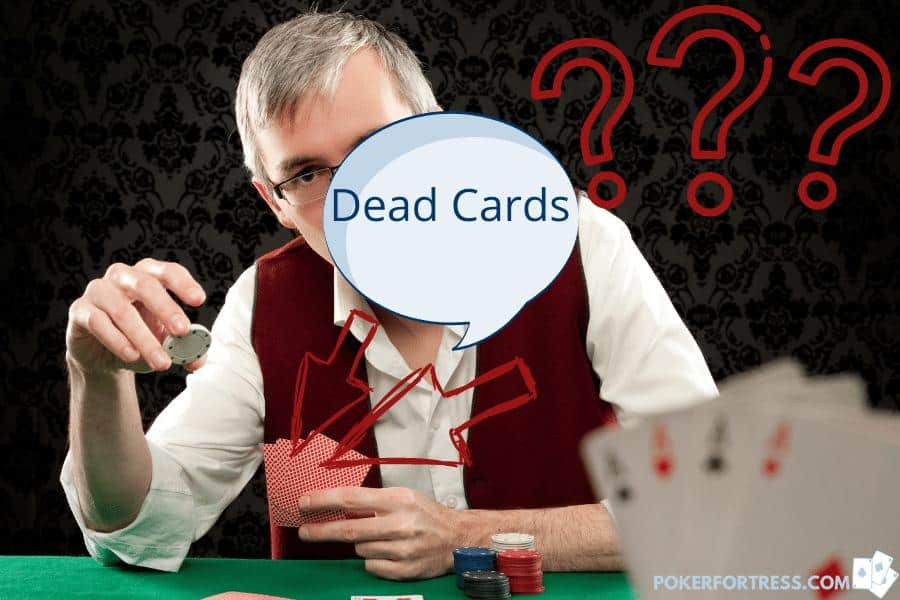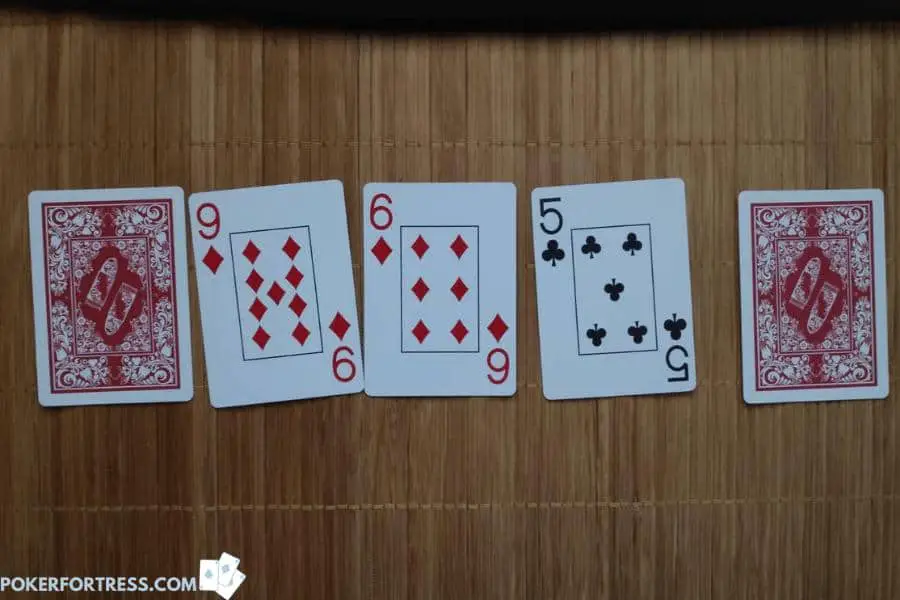Aside from poker’s complexity and ambiguity, another factor that makes it hard for people to learn poker is translation. Poker slang makes commentators entertaining, but what’s not fun is when you hear them say “dead card” and don’t understand what they mean. We would be remiss to not talk about dead cards and why it matters when playing poker, right?
A dead card in poker refers to a card that is impossible to be dealt with the remaining deck. It can be because of a foul or another player folds or holds the card. It’s crucial when counting outs to determine your odds to win because the more dead cards there are, the lower your poker out gets.
We’ll discuss everything about a dead card in great detail to help you incorporate it with your strategies. We’ll also discuss another term that confuses many players, which is card dead. Stick around to learn everything about it, including some of the best ways to use it.

The Basics of Dead Card
Poker is a game of skill. However, there’s a certain percentage that luck plays in every game. Poker outs are the most accurate way of calculating your odds to win. Poker odds considers the number of cards that are still in play, which gives you the percentage of drawing a card that improves your hand.
For example, you have pocket aces (A♣ A♦), and the flop is Q♦ A♥ 6♠. In this scenario, you have 7 outs to have a made hand, such as A♠, Q♣, Q♥, Q♠, 6♣, 6♥, and 6♦. With 7 outs, you have a 14.89% chance to have quad aces, aces full of queens, or aces full of 6s by the turn, and a 15.22% chance by the river. It’s a substantial percentage to build a dominant hand because you have a 27.84% chance to get the card you need in either street.
However, poker outs calculation doesn’t consider the cards already on the table, which are the dead cards. If your poker outs are already on the table, you can’t get those cards, which will significantly reduce your chances of having a made hand.
Here’s how a dead card can affect your chances of winning:
- If only one of your poker outs are already on the table, meaning another player holds it, you only have 6 outs (not 7 anymore). It means that you have a total of 24.14% chance to draw any of the cards you need on either the turn of the river.
- You have a combined percentage of 20.35% with 5 outs, 16.47% with 4 outs, 12.49% with 3 outs, and only 8.42% with 2 outs.
- Since your poker outs are mostly premium cards and within most people’s range, it’s possible for you to only have 1 out with 4.26%.
- If all of the cards you need are already out on the table (on the board + in other players’ hands), you’re drawing dead because you’re playing a hand that is impossible to improve.
A dead card is crucial for reviewing hand histories, but it’s impossible to accurately determine your poker outs when you’re in an actual game.
When you’re playing Hold’em, dead cards are the cards that other players have in their hands, so you can’t see it.
The games where you can use a dead card to calculate your chances include Razz and 7 Card Stud because you see most of them. When you’re playing Razz, you want the cards that you have to be on the table and not the ones that you need. Remember, the more dead cards you get, the lower your chance of winning the game.
In Razz and 7 Card Stud, each player gets their hole cards and a river card, so it’s impossible to determine your poker outs accurately. However, since most of the dealt cards are on the table face up, it gives you an idea of how well your cards stack up against your opponents.
Dead Card and Card Dead: What’s the Difference?
A dead card in poker is pretty straightforward, but many people are confused because of “card dead.” It’s another poker slang with a different meaning, but many people get confused when listening to some commentators.
When we say that a player is card dead, he hasn’t received any playable card for hours.
It’s mostly 82 offsuit or other similar hands that even loose cannons might think twice before playing. It’s close to running bad, but a player running bad still gets a few playable hands, while a card dead doesn’t.
Card dead can be very frustrating, but it happens to everyone. Even the best poker players get card dead when they’re on the table. It can be disappointing not to play anything for hours, especially if you see your stack dwindles without having a chance to get it back.
Card dead is more of an emotional issue when playing poker, while a dead card is related to your chance of winning the hand. However, it doesn’t mean that being card dead will always be something negative for a player. There are a few things that you can do to take advantage, or at the very least, manage the frustration of being card dead.

How to Still Win Chips When You’re Card Dead
Being card dead can happen anywhere at any time, even when you’re in a prestigious tournament. The first couple of times that it happens, one may think that he’s only running bad, so managing the risks is the key. When you’re getting bad cards over an extended period, things start to worsen because that’s when emotions take over, then tilt.
Here are 3 things that you need to remember to win some chips when you’re card dead:
Keep Your Emotions in Check
Being card dead for hours can put anyone on tilt, but do your best to keep your emotions in check. Knowing that it can happen to anyone will help you stay calm and rational with everything that you do on the table. Remember, tilt is the one thing that took down more poker players than any other factor, so you need to control your emotions and wait for the right time.
Play With Your Image in Mind
Your image as a player is what your opponents use to play against you. When you’re playing aggressively, then being aggressive when you’re card dead won’t be beneficial because your raises won’t get as much respect. However, if you’re playing tight even before you’re card dead, your bluffs will be more effective.
Steal and Re-Steal Blinds to Keep Afloat
Cash games or tournaments, your chips will dwindle when your card dead for hours. Regardless of the stakes on your table, be sure to try and steal or re-steal blinds. It’s easier when you’re in a late position. However, you can also try stealing the blinds when you’re in early position, especially if you’re playing within the image that you’ve portrayed throughout the game.
Conclusion
A dead card has a massive impact on your odds to win any game, so you always need to consider it when playing. However, its accuracy when playing may not be as reliable because of the ambiguity that poker creates. Although it helps, you still need to be very careful when using it to make your decisions.
The more cards you see on the table, the more accurate counting dead cards get. If you’re playing stud games, dead cards can be beneficial for you.
However, if you’re playing Hold’em, dead cards are irrelevant because there’s no way to see the cards that your opponents hold unless you’re reviewing hand histories where the hand went to showdown.



